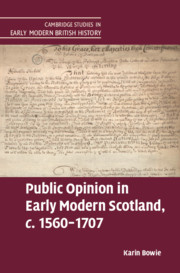Book contents
- Public Opinion in Early Modern Scotland, c.1560–1707
- Cambridge Studies in Early Modern British History
- Public Opinion in Early Modern Scotland, c.1560–1707
- Copyright page
- Contents
- Acknowledgements
- Abbreviations
- Introduction
- Chapter 1 Protestations
- Chapter 2 Petitions
- Chapter 3 Oaths
- Chapter 4 Public Communications
- Chapter 5 The Inclinations of the People
- Chapter 6 The Sense of the Nation
- Conclusions
- Bibliography
- Index
Chapter 1 - Protestations
Published online by Cambridge University Press: 21 December 2020
- Public Opinion in Early Modern Scotland, c.1560–1707
- Cambridge Studies in Early Modern British History
- Public Opinion in Early Modern Scotland, c.1560–1707
- Copyright page
- Contents
- Acknowledgements
- Abbreviations
- Introduction
- Chapter 1 Protestations
- Chapter 2 Petitions
- Chapter 3 Oaths
- Chapter 4 Public Communications
- Chapter 5 The Inclinations of the People
- Chapter 6 The Sense of the Nation
- Conclusions
- Bibliography
- Index
Summary
Though protestations have been little studied as an early modern mode of resistance, in Scotland the protestation was transformed from a routine means of expressing formal dissent into an assertive mode of collective resistance. Protestations in political settings challenged royal and institutional authority with public statements of argument, highlighting the views of groups outside authorised assemblies. Extra weight could be provided by collecting the signatures of adherents, stimulating opinion at large, while the trope of Christian testimony provided a justification for the disruption of strong cultural norms for consensus. This chapter reveals the use of protestations for and against ecclesiastical and constitutional innovations in Scotland, including the creation of ‘the Protesters’ in 1650 and the making of public testimonies by hardline dissenters in the Restoration period.
- Type
- Chapter
- Information
- Public Opinion in Early Modern Scotland, c.1560–1707 , pp. 21 - 49Publisher: Cambridge University PressPrint publication year: 2020

